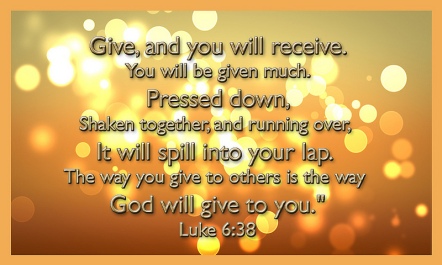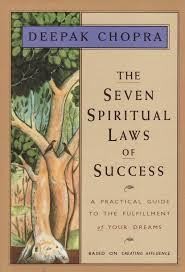Deepak Chopra‘s book, “The Seven Spiritual Laws of Success,” has been such a touchstone for me that I’m writing about each of the seven laws over the coming weeks.
The Law of Giving
 I grew up in a household where it felt like there was never enough money, then I spent four years as a poor college student before accepting my first newspaper reporter job, where I made almost nothing.
I grew up in a household where it felt like there was never enough money, then I spent four years as a poor college student before accepting my first newspaper reporter job, where I made almost nothing.
I didn’t feel generous, I felt like I needed to be frugal to make ends meet. Now I wish I could go back and tell young, poor me to share what I could — my time, my attention, my meager means.
Chopra advises that this law could be called the law of giving and receiving, because giving and receiving are part of the same action. If you want to receive more, you have to give more.
Money is a symbol of the life energy we’ve given in service to the universe. If you stop the circulation of energy, it’s like stopping the flow of blood and it coagulates, Chopra explains. The word affluence comes from the word affluere, which means to flow in abundance, so giving contributes to the flow of abundance rather than damming it up.
Frank Sinatra apparently believed the same thing, though he expressed it in less new age terms. Biographer Bill Zehme quotes Sinatra saying, “You gotta spend it. Move it around.” Zehme says of Old Blue Eyes, “When he had none, he spent as though he did; when he became rich, he spent as though there was no end to it.” He showed friends lavish generosity, but also routinely tipped in 100 dollar bills.
Chopra addresses my concerns of poverty, acknowledging some might ask, “How can I give to others when at the moment I don’t have enough myself?” You can give something inexpensive, like one flower, or you could give something free, like a note, a prayer or a compliment.
“The most powerful forms of giving are nonmaterial — the gifts of caring, attention, affection, appreciation and love are some of the most precious gifts you can give and they don’t cost you anything,” he says.

I recently blogged about some of the ways I nurture my relationships, including setting aside time to send cards to people we care about. You could call or text or email or visit, however you like to express your love and appreciation.
My aunt didn’t have a lot of money but you could be sure you would find fresh-baked cookies when you visited her house, and she visited people in the hospital to give them communion. She gave what she could, which was largely her time.
When I asked friends for stories of small but meaningful gifts, one recalled working retail on Christmas Eve in the 1980s and having to deal with two challenging customers — then another customer who saw some of the hassle gave her a piece of candy. Several decades later, she still carries the memory of that kindness.
Feeling cash strapped isn’t the only reason generosity might not come easily at first. A friend wrote a few years ago about trying to give simple gifts to strangers and finding her fear of being refused paralyzed her. But so what? Give to someone else.
When we went to Burning Man a few years ago, one of the aspects of the giant desert gathering that struck me most was what happens when giving is explicitly part of the culture of a group. People work hard to prepare gifts for the community, but that only works if other people receive, and burners enthusiastically seek out the gifts and experiences that resonate with them.
Chopra advises,”As long as you’re giving, you will be receiving.”
This isn’t just because of the energy you’re putting into the universe. It’s because we’re pack animals and society is held together with an idea called reciprocity. If you do something for me, I feel a strong urge to do something in return for you. You scratch my back, I’ll scratch yours.
Have you ever wondered why charities send you return address labels, greeting cards or a calendar when they ask you for a donation? It’s because when you receive something, you’re more likely to give in return.
Several years ago, I took a class called Relationship Master Academy that taught how to nurture relationships as a component of success in life. Author Keith Ferrazzi instructed leading with generosity in networking — if you’re emailing someone because you think that person can help you in business, first give thought to what you can offer him or her, and wait to make a request until you’ve been of service.
That doesn’t mean you’re being manipulative when you give, but it’s pretty incredible to watch it in action. We recently hosted a party and our friends lavished us in baked goods and alcohol, as well as emails and texts of thanks. What we received in exchange for our generosity was tremendous.
“The return is directly proportional to the giving, which is unconditional and from the heart,” Chopra says.
How can you put the law of giving and receiving to work?
- Wherever you go, give a gift — it could be a compliment or a prayer, or some small material thing like a flower. Commit to circulating wealth.
- Gratefully accept all gifts — that includes the gifts of nature like sunlight and birds singing, as well as compliments and gifts from others
- Keep wealth circulating by giving and receiving the most precious gifts: caring, affection, appreciation and love.
Would you like to know more about the law of giving? Read more.

